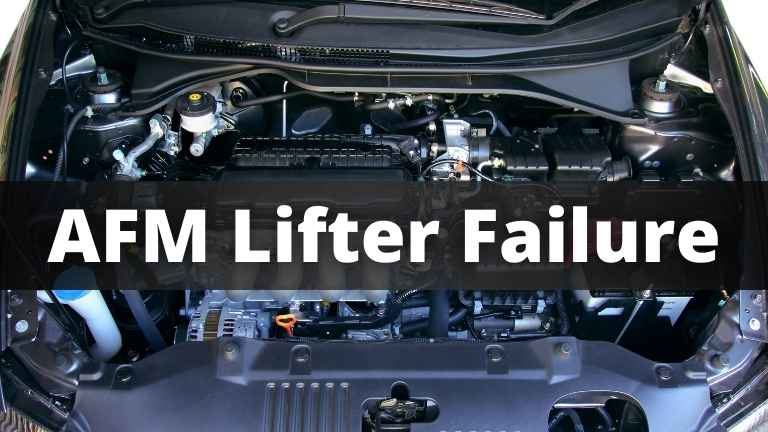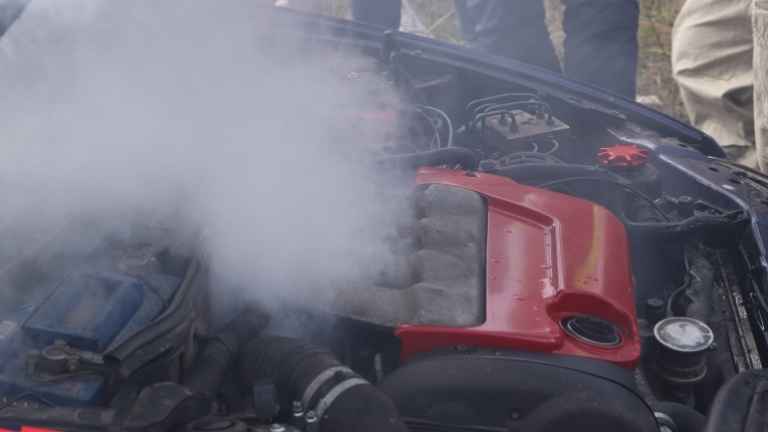If you are a car owner, then you should be aware of what causes AFM lifter failure and how to fix it.

This article will provide insights on the issue as well as helpful tips for preventing your vehicle from having any issues in the future. Let’s dive in.
Why AFM Lifter Fails?
Here are the reasons why Active Fuel Management lifter fails-
Using Low-Quality Oil
One of the main reasons behind the AFM lifter issue is using low-quality oil in the vehicle. You might think that it’s not a really common reason, but I can bet you that it’s one of the most common reasons that lead to AFM lifter malfunction.
It has been seen many times that using poor quality oil will bring about several issues, including damage to the AFM lifter. In such cases, you’ll need to replace all these parts and reroute your stock tanks with new ones as soon as possible. The problem is truly something unconstructive in terms of efficiency and effectiveness; therefore, this should be addressed properly before anything else.
Don’t get me wrong when I say ‘low-quality oil’. It doesn’t mean you should go with the premium-priced fuel. It means that you should use the correct fuel that the manufacturer of your car asked you to use.
Not Enough Oil In The Lifters
Just like any other component present inside your vehicle’s engine unit, an AFM lifter also requires an adequate amount of lubrication. And if there is a lack of it, then you should know that it can lead to some devastating results in the long run.
The main problem here is that using inadequate oil or an insufficient amount of it will mostly damage the sliding parts and create friction between them. This friction can cause indents inside the seals and ultimately bring about a failure in AFM lifters altogether. Using less oil will not only lead to failure but will increase fuel consumption as well as lowered your effectiveness levels significantly. You definitely don’t want that, do you?
Regular Wear and Tear Due To The Use
This one is again related to general wear and tear; therefore, it’s only common to present in case of constant use. In such situations, it’ll be obvious that the AFM lifter will age sooner than later, and this can cause issues related to performance levels as well.
This is due to the fact that ongoing wear and tear caused by regular use will also lead to the failure of your vehicle’s Active Fuel Management System at some point. The way an AFM works is pretty much similar to any other mechanical parts found inside your vehicle’s engine unit; therefore, there is nothing strange about this fact.
There are many reasons behind this issue and being said so, you should take care of these things seriously if you don’t want any kinds of trouble in future.
How to Prevent AFM Lifter From Failing?
To avoid AFM lifter failure, the first thing you need to do is use appropriate quality oil. It doesn’t matter what kind of car you’re driving, it will always tell you what type of oil should you use through its manual or label on the engine.
Secondly, make sure that you have maintained and tuned your car. This is going to reduce the chances of any issues due to wear and tear.
Thirdly, go for regular servicing and maintenance up at the nearby garage. This is going to keep your AFM lifter in perfect condition and absolutely safe from any damage.
Another way is to disable the AFM so that the AFM lifter will not be in constant use. This is also going to lessen the amount of wear and tear being caused by regular use of your vehicle. Now, that’s a preventive step you should take!

Active Fuel Management (AFM) Lifter Failure Symptoms
And now, let’s dive a little deeper into this article by uncovering the signs of AFM lifter failure. From here on, I will mention several symptoms that can help you realize the issue in advance so that you don’t have to worry about major problems later.
Poor Acceleration
Now, this symptom is quite confusing for some people. It can be easily mistaken as poor acceleration because of the higher amount of power that needs to be delivered at a time but in reality, it’s not so. Poor acceleration can lead to engine grinding which can cause additional damage altogether.
In case you observe such symptoms from your car’s performance levels, then you definitely need to take immediate action as soon as possible. This failure will affect the entire drivetrain and general working mechanism within your vehicle’s engine unit according to its efficiency level. So, if something happens due to this failure, it won’t let you move further or even make a smooth U-turn at one point in time; therefore, prevention should be your top priority.
Difficult Downshifting
This is another AFM lifter failure symptom that is very common these days. People who have driven a vehicle with this issue will easily recognize it as a complete mess during the process of downshifting. This can cause damage to other parts such as your flywheel, clutch, and transmission on the whole; therefore, you should not ignore it at all costs.
Lack Of Power
Normally, an engine should be able to deliver its optimum amount of power when asked for; but in case your car’s engine unit fails to do so, then you’re looking at several issues here.
Sometimes, poor acceleration along with lack of power may indicate problems related to engine timing and cylinder misfire. But in this case, under no circumstances, you should ignore the AFM failure warning.
Sudden Stalling Issue
This is again one of the key symptoms of AFM lifter failure which can also cause engine grinding problems. The fact that your car may stall abruptly without any prior notice can be quite dangerous and annoying at the same time because it will make you lose control over your vehicle several times per day.
As a result, such issues are only going to worsen and if left unattended for long enough, they’ll surely lead to very expensive expenses in the future. So whenever you encounter any sudden stalling issue, get the problem fixed as soon as possible to avoid further complications afterward.
Hesitation During Acceleration
It’s quite common to feel as if your car’s engine is hesitating while accelerating. This hesitation can be caused by several issues such as temperature, mass airflow sensor failure, or AFM lifter failure; therefore, you should keep a check on this symptom from time to time.
Engine Grinding Sounds During Acceleration
It’s not uncommon for loud noises like grinding sounds to come out of the vehicle’s engine unit during acceleration. There will obviously be an abnormal level of friction that can occur among the parts because of insufficient lubrication and sufficient heat due to an improper cooling system inside the engine unit.
You need to take care of this issue right away because otherwise, it will only lead to further problems in the future. Also, don’t put off this issue because you might end up having to spend a lot more money in the future due to AFM failure.
Vehicle Jerking On Acceleration
Vehicle jerking is also one of the telling signs of failed AFM lifter. If your car seems to be jerking from side to side without any prior notice, then you should know that something may be wrong with it.
There can also be other issues such as tires or flat spots on your wheels which may lead to an insufficient amount of friction for smooth acceleration. In this case, it’s important that you take care of these issues before they grow into bigger problems later on in life.
Excessive Engine Temperature During A Drive
This temperature can easily get out of control if it’s not checked several times per week. It can be quite dangerous because engine overheating may lead to permanent damages as well in a very short duration of time.
Therefore, you need to keep an eye on this symptom from time to time in order to avoid such consequences.
Excessive Engine Oil Usage
While it’s a good idea to use more engine oil in the winter season, but there are chances that your vehicle may start using significantly high levels of oil during springtime or fall season as well; therefore, you should keep track of it.
In case you find out that your car is burning through excessive amounts of oil without any prior notice, then it might be due to failed AFM lifters and other internal issues which can all be fixed for good.
Engine Noises During Operation
Sometimes, there will be a loud humming or whizzing sound coming out from the car’s engine unit during operation. It might also feel as if something is inside your vehicle which is shaking rather violently without your prior notice.
Such noises can indicate several problems such as AFM lifter failure or any other internal issue within the engine unit which can have devastating effects on its performance in the future. Hence, you should take care of it right away to avoid further complications later on in life.
Excessive Smoke From The Exhaust System
In case your car has started emitting excessive amounts of smoke from its exhaust system while operating, then it may mean that an internal issue exists within the vehicle which can lead to much more serious consequences if not taken care of immediately.
Vibrations While Driving Down The Road
The car’s engine may start vibrating throughout its complete unit or at least throughout some particular parts inside it; this problem isn’t as common, but it does happen from time to time.
There might be some internal issue such as AFM failure which is causing these vibrations so you should always have your eyes open toward solving the problem right away.
Such an issue could also arise due to low levels of lubrication in between the moving components within the engine unit wherein friction build-up can end up with irregular vibrations in the future.
Thus, don’t take any chances when it comes to addressing this symptom because ignoring it can cost you a lot.
Is it safe to disable AFM?
Yes, it is. There are many aftermarket companies that offer a kit that can disable the AFM system, but you should be careful while installing it because most of the kits do not come from the factory and there is always a possibility that they will cause further problems.
Other than this option, you can also opt for an AFM delete but be careful while installing it as well.
What is the best way to fix failed AFM lifters?
The best way is to replace the faulty lifter with a good quality one. This will ensure a stress-free ride in your car. Make sure to maintain the car from now on so that you don’t end up having more failed lifters.
Conclusion
The AFM lifter failure is a common problem in vehicles and it can happen to any car. There are several causes of this issue, which we have listed above.
In order for you to fix this issue permanently without worrying about future problems arising out of it again, there are certain steps that you need to take such as replacing the faulty lifter with good quality one and maintaining the car properly from now on.
It’s better not to disable AFM because doing so may cause more harm than good if done incorrectly or with a faulty disabler and lead your vehicle towards further complications later on in life.